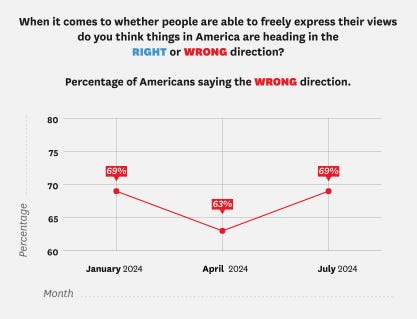Scarlett Johannson claims ChatGPT stole her voice, NIH scrubs SM comments, & more!
Bringing you the latest free speech news (8/4/24)
Stories of the week
NOTE from Greg: I use ChatGPT all the time. When I heard that Scarlett Johansson was claiming that her voice had been copied, I assumed it was some version of ChatGPT that I had never heard before. When I realized it was the same slightly raspy ChatGPT voice I had grown accustomed to, I had a hard time believing that Scarlett Johansson could claim it was sufficiently similar to her own voice to make it outrageous. If anything, it sounded more like Rachel Martin from NPR, but certainly not a precise copy of anybody else. So with that introduction...
Can someone own a voice? Breaking down the right to publicity by Jacob Gaba
POLL: Majority of Americans believe the First Amendment goes TOO FAR in the rights it guarantees
61% of Democrats and 52% of Republicans at least slightly agree that the First Amendment goes too far in the rights it guarantees.
Half of Democrats — but only one-fifth of Republicans — think America is on the right track when it comes to free speech.
This week in FIRE’s blog
I grew up in Cuba. Self-censorship in American universities is all too familiar to me by Justo Antonio Triana
New title IX regs are a confusing mess that threaten student rights by Robert Shibley
Americans don’t trust the government to regulate speech by Emily Nayyer
How the US economy is bolstered by the free marketplace of ideas by Nicholas Baum
SURVEY: Most college students don’t know their college’s protest policies
What happened on BET when Usher tried to speak? by William Harris
This week in ERI
This week on ‘So to Speak’
So to Speak host and FIRE EVP Nico Perrino spoke with the co-author of the much-fought over Section 230, Christopher Cox, about the law’s legacy and contemporary calls for its repeal.
International free speech story of the week
Behemoth’s blasphemy case dropped by Polish government (Revolver) by Gregory Adams
The Polish government had been up in arms the past few years over a Behemoth T-shirt that tweaked the country’s coat of arms, with the traditional white-crowned eagle flanked by skulls, swords and serpents. Starting in 2017, Behemoth founder Adam Nergal Darski, merch designer Rafal Wechterowicz and the band’s webmaster Maciej G. were accused of blasphemy, and taken to court a few times over the merch item. Multiple cases had been thrown out of court over the years, and now, according to the band, it seems like the government has finally given up for good.
London Calling: Ronnie’s First Amendment Rundown
In another win for online speech, the D.C. Circuit held this week the National Institutes of Health violated the First Amendment rights of animal rights activists by hiding their comments to the NIH’s Facebook and Instagram pages through use of automatic keyword filtering that prevented comments using terms like “PETA, #stopanimaltesting, cruelty, testing, and animal” (among others) from appearing. While NIH claimed to use the filter to enforce its ban on comments “off topic” from its own posts, the court held it was not a reasonable restriction on speech in the limited public forum NIH created by allowing public comments – even those commenting on-topic to posts about NIH experiments, the basis for a great many agency posts, would get caught in the filter simply by using words like “testing.” The court also noted (without deciding) that inclusion of some of the anti-animal experiment words suggested NIH’s intent was to engage in viewpoint discrimination of its critics, one of the biggest First Amendment no-nos a government actor can commit.
Song of the Month
I typically recommend a “song of the month” and then try to find whatever music video exists to go along with it. Sometimes the video is great, and sometimes… well, not so much. In this case, the music video is even more freaking awesome than the (also awesome) song. Enjoy!






Wasn’t she the voice in that movie “Her”? This is very strange.
Defamation, slander, and libel are concepts that rely on being able to exact punishment or compensation for someone telling lies (falsehoods, untruths, etc) about you, in essence trying to use your likeness for things that are not true and damaging. I can't see how to avoid classifying the vast majority of deepfakes as defamation, because they are all untrue by definition, even if they're supposed to be positive, a la Super-Biden Punches Oil Baron In The Face And Rescues A Baby Deer.
It might be a matter of interpretation regarding the Voice, but you and ScarJo drew opposite conclusions in this instance, which is what Altman & ilk count on. And in this instance, Altman, whose role in this Voice debacle has already been explained in many places and has not been "consistently candid" in multiple other instances, has ample motivation to harness ScarJo's impressive celebrity to increase his own gravitas, especially if he can get it for free under a veneer of plausible deniability.